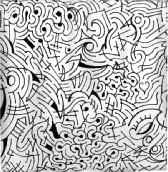



 NEXT
NEXT
 BACK
BACK
 Forum
Forum


Philosophical musings on Quanta & Qualia; Materialism & Spiritualism; Science & Religion; Pragmatism & Idealism, etc.





Post 61. December 25, 2018 continued . . . .
God's Inscrutable Plan
Whys Seeking Wisdom
Postscript: From the PanEnDeist perspective of my own philosophical worldview, Enformationism, our finite world seems to have been created by an enigmatic infinite BEING. But the motive or reason for that incognito creative act remains a matter of fervid speculation, including by yours truly. What was the point, the goal, the denouement of this open-
On the other hand, why not? Most of these plaints assume that egocentric homo sapiens were the reason for the creation. But history, including most of the Greek Tragedies and the Old Testament, reveal an at best indifferent Fate, and at worst an evil deity. Even if the gods love us in their own peculiar way, from the human perspective, the vicissitudes of life can be interpreted as an absurd “tragedy” of undeserved suffering. The Greek term, meaning literally “goat song”, was perhaps a snear at cruel circumstance. Yet, the defiant victims of faceless Fate find morsels of meaning wherever they can, despite the value vaporizing force of apathetic Entropy, the bull in the china shop of sentiment.
But what if the sages of the past wove their fictional narratives from the wrong assumptions? Idealistic Priests imagined that a perfect deity could only create a perfect world. Ironically, with paradise at the beginning, the story could only develop downward into decay and decadence. Hence, cynical playwrights caricatured the gods as self-
Those escalating emergences seem to indicate, not only that the universe is developing toward something better than the status quo, but that humanity is emerging from its primitive origins, and improving in its humaness. Consequently, we may be wise to interpret the signs to mean that there is indeed some plan or purpose guiding the cosmic machinery of maturation. But it would be foolish to think that we awakened apes are the be-
End of Post 61
Inscrutable
That which cannot be easily understood; obscure; unfathomable; mysterious

Tragedy or Comedy?
“Life is a comedy to those who think, a tragedy to those who feel.”
― Jean Racine
The happy ending of the fairy tale, the myth, and the divine comedy of the soul, is to be read, not as a contradiction, but as a transcendence of the universal tragedy of man...
__Joseph Campbell
“The effort to understand the universe is one of the very few things that lifts human life a little above the level of farce, and gives it some of the grace of tragedy.”
― Steven Weinberg
Tragedy is the difference between what is and what could have been.
__Abba Eban
On why the universe exists :"If we find the answer to that, it would be the ultimate triumph of human reason—for then we would know the mind of God"
__Stephen Hawking
“As far as we can discern, the sole purpose of human life is to kindle a light in the darkness of mere being.”
__Carl Jung
“God has a plan for all of us, but he expects us to do our share of the work”.
__Minnie Pearl
“For God has a plan, and that plan is evolution.”
__Jiddu Krishnamurti
2. Cosmic Mystery :
As with any good mystery story, the Ultimate Author of our saga carefully conceals the surprise ending, but sprinkles clues along the trail to keep the readers guessing. Since humans are innately curious creatures, and the brain is a next-
Religion, Science, and Philosophy are all in the business of discovering clues and inserting them into the incomplete puzzle. But they each use different heuristic and interpretive techniques. Why not make use of all?
3. Game of Thrones :
The HBO series is a sort of medieval mythical tragedy, in which the power-
Even as the quarreling rulers and meddling deities make life miserable for both their enemies and their subjects, the common people find ways to enjoy life, and to make merry despite their undeserved suffering.
The lesson we can draw from this oblique critique of the human condition is that of Existentialism : individual people have enough freewill to plot their own course through the ups & downs of life. They have no control over the main storyline, and little comprehension of the overall purpose of the world in general, but they can define their personal meaning, and justify their existence, by making authentic unforced choices, regardless of the will of whatever gods may be.